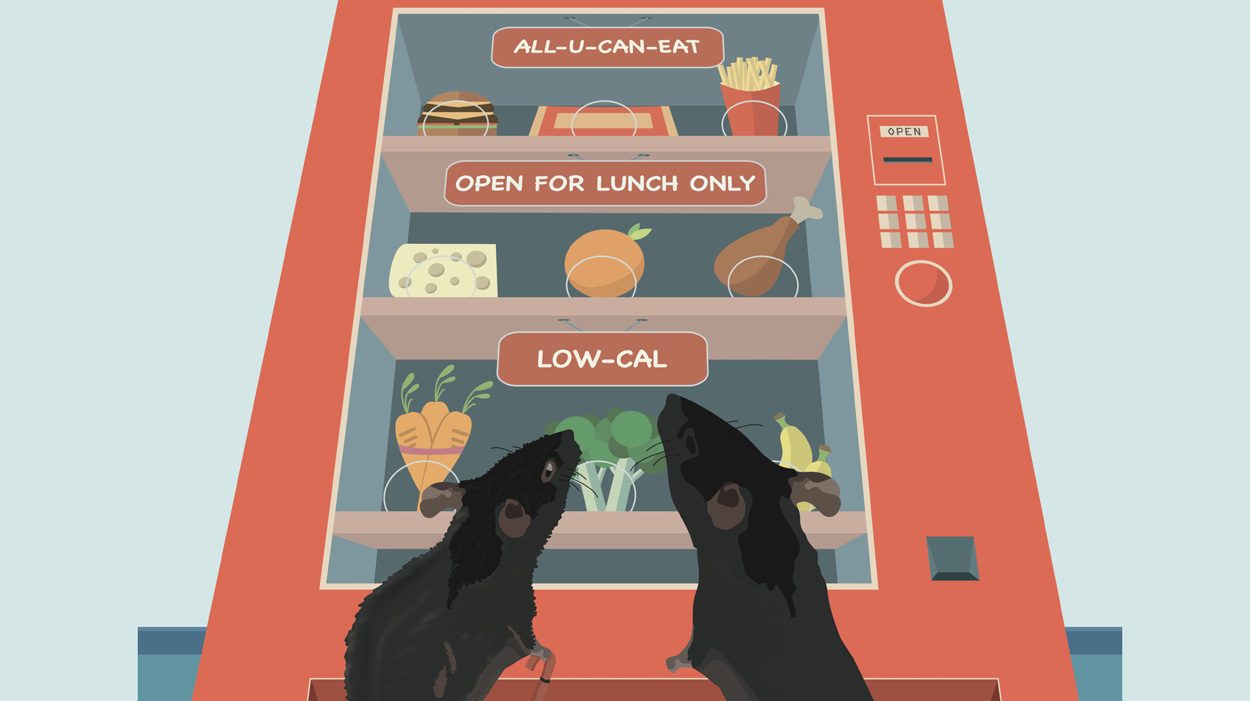Certain diets are designed to help extend lifespan. The researchers have now shown in mice that a calorie-restricted diet combined with periods of daily fasting is actually associated with a longer lifespan, at least in rodents. Mice whose food was restricted lived an average of 10 percent longer than their peers, who could eat whenever and as much as they wanted. If they only get their food at night, i.e. at the time of their normal activity, they are 35 percent bigger.
Many people hope that dieting will not only reduce body weight, but also lead to a longer, healthier life. In fact, there is scientific evidence that limiting calorie intake and eating only certain times of the day can be beneficial for health. Researchers believe that even regardless of potential weight loss, such a diet can extend life. However, it is not yet clear which factors and mechanisms play a role.
automatic feeding
A team led by Victoria Acosta Rodriguez of the University of Texas at Dallas tested in mice how different nutritional concepts affect life span. To do this, they divided more than 200 mice into six groups: The control group was allowed to eat whenever and as much as they wanted. All of the other mice received 30 to 40 percent less food than the control group at different times, and each remained constant throughout the mice’s lifespan. For precise control of food intake, all mice lived in individual cages and received their daily rations via automated feeders.
One group received its full food ration, nine feed pellets, at the beginning of the day, and another group at the beginning of the night. Since the mice ate immediately and consumed everything within two hours, the daily fasting period of these animals was about 22 hours. Two other groups received food pellets every 90 minutes for 12 hours, either during the day or during the night. The last group received the nine forage pellets evenly distributed over a 24-hour period.
The timing of eating is important
The researchers observed the mice for a total of four years until they all died of natural causes. In addition to life span, they also documented several metabolic factors, regularly weighing the animals’ body weight and recording the times the rats ran in a jogging wheel, that is, were physically active. All groups maintained their normal activity pattern throughout their lives and were active mainly at night, the researchers stated. “However, rats fed during the day showed relatively more activity during the day. Therefore, they discontinued the resting phase, although they continued to show nocturnal behavior. This would have negative metabolic consequences.”
However, day-fed mice live on average longer than free-fed mice, which eat 75 percent of their food at night. “Mice from the control group lived an average of 792 days, which is just over two years,” the researchers say. “In mice on a calorie-restricted diet, life increased by 10 to 35 percent, depending on the time of feeding.” He lived an average of 942 and 959 days, respectively. The researchers concluded that, “In addition to reducing calories, a daily fasting period of at least twelve hours has positive effects on longevity.”
Effect on gene regulation
The mice that received the reduced-calorie diet lived the longest night. They lived an average of 1,058 or 1,068 days, depending on whether they were fed more than 12 hours or once. There was no significant difference between the two feeding variables. The researchers concluded, “Consequently, a 12-hour fast appears to be sufficient to extend the life of the mice.” Additionally, their results show that it was health-promoting, at least in mice, if the food was eaten during the time of normal activity.
But why does the timing of eating affect age? The ratio of weight and body fat of mice from all calorie-restricted groups was similar, so it cannot be conclusive alone. On the basis of gene expression analyzes, the researchers found an additional influencing factor: apparently, diet influences genes involved in the mice’s day and night rhythm. While inflammatory processes increased with age in mice fed a distributed diet, the daily fasting periods partly reversed these age-related genetic changes — more effective when fasting occurs during normal rest periods. If applied to humans, this means that it is best to eat during the day. However, it is still not clear to what extent similar effects can actually appear in humans.
Source: Victoria Acosta-Rodríguez (University of Texas, Dallas) et al., Science, doi: 10.1126/science.abk0297

“Alcohol buff. Troublemaker. Introvert. Student. Social media lover. Web ninja. Bacon fan. Reader.”





More Stories
Huge radiation explosion from a magnetar – forschung.de
Principles and features of the folk nutritional principle
Science: The percentage of women in mint topics rises to a third